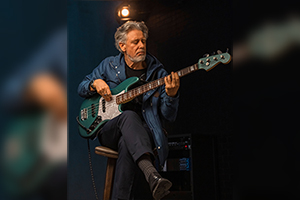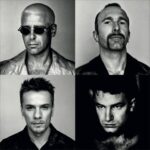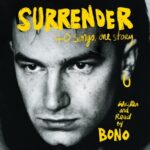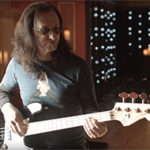U2 bassist talks Fender signature amp, compilation of newly reimagined songs
Exclusive interview with Gary Graff
April 3, 2023
Photo courtesy of Fender
U2’s recent activities have been dominated primarily by Bono and The Edge, but rest assured that Adam Clayton has been busy, too. In addition to taking part in some of the band’s archival activities during the pandemic, the bassist – who co-founded the group 47 years ago in Dublin, Ireland – narrated the 2022 documentary Francis Bacon: The Outsider about the Irish-born artist’s return to his homeland in 1929. Clayton, 63, also teamed with Fender for a signature bass amp, the ACB 50, that’s rolled out this year – just in time for U2 to rev up again. Coming on the heels of Bon’s 2022 memoir Surrender: 40 Songs, One Story and subsequent run of solo shows, U2 has released Songs of Surrender, featuring stripped-down and reimagined versions of 40 songs from the group’s catalog as well as an accompanying U2SOS40 video series. This fall, meanwhile, the band will be back on stage for the first time in four years as the opening residency act at the MSG Sphere in Las Vegas – though drummer Larry Mullen Jr. will be sitting the stand out to tend to injuries he’s accumulated over the years. Clayton – who recorded a new version of the “Theme From Mission Impossible” with Mullen for the film in 1996 – is ready to go and happy to have U2 in the air once more…
FBPO: How did the ACB 50 come about?
Clayton: The amplifier was one of those once-in-a-lifetime experiences. I’d had a relationship with Fender for a number of years and we did these signature basses, which was fun and exciting and kind of appeals to my design side. Fender had put out an amp for Edge and I got a little jealous I guess. I thought, “Well, if Edge can have an amp I’m gonna have an amp!” (laughs) So I spoke to the guys at Fender; I said, “Look, have you ever done a bass amp with an artist, a signature endorsement?” They said, “No. We don’t really do signature endorsements (of bass amps). There’s not much of a call for it.” And I said, “Well, y’know, that’s because you make bass amps that sound a certain way. But I’m always looking for a different sound out of a bass amp. Would you be up for the challenge of creating something unique and interesting? Maybe it’ll be something other bass players will be interested in.” That’s how it started out, and I have to say the guys at Fender were up for the challenge.
FBPO: So what was your vision?
Clayton: They were very respectful; they didn’t mind me saying I wouldn’t play one of their old vintage amps because it didn’t have enough midrange in it. They explained to me the Fender amp design scooped out the midrange, which is why I could never get excited by it. Then we set about creating a midrange booster system, which was something you hadn’t heard in a Fender bass amp before.
FBPO: And you decided to make it a combo rather than components.
Clayton: When I started out I was taught big gear made you sound good. It was where it was at. And nowadays I don’t think that way. You can get great sound on small gear. I don’t like being loud in the way I liked being loud when I was a teenager. So I said, “Let’s do a combo. Let’s do something that’s of good size and good proportion.” My live sound in the last 20 years has been relying on a number of different combos all blending sounds together and running different effects on different amps, so I needed something where I could fit three or four of them under the stage – ’cause that’s where we mount them when we’re working live – and the Adam Clayton Bass 50 is kind of what’s come out of that.
FBPO: It’s not exactly a quiet little thing, though.
Clayton: (laughs) It’s a very loud 50 watts – the loudest 50 watts you’re ever gonna need. And you can fit it into a smart car or whatever, and drive it to a gig or carry it up the stairs on your shoulder as well and set it up and you’re good to go. It’s the kind of amp you can take anywhere, you can do anything with it and it just keeps on giving.
FBPO: I take it that’s what fans will be hearing when U2 plays at the MSG Sphere this fall?
Clayton: I’m about to go into rehearsals and I’ve asked Fender to deliver me four or five of these so I can really play around with different sounds. At this point I don’t know what the set is gonna be like, so it’s gonna be quite hard to imagine I can do everything on just one or two combos. So it’ll be a combination of them to set up the different sounds. But I’m excited about going forward with these amplifiers and really making it part of my sound.
FBPO: I imagine you’re just excited by the prospect of playing live again. It’s been a good long while.
Clayton: Y’know, I’ve always liked playing. There’s something about the roar of the crowd and the element that being in front of a crowd brings to the music and brings to the playing. It’s where the magic happens. And I think in some ways as a musician you’re serving the audience. You are the thing that they gather around. You create the music that takes them somewhere else, and they take you with them if you’re lucky.
FBPO: These shows will be the first time U2 has played without Larry, which is particularly more resonant for you as a bassist. What are you anticipating?
Clayton: Well, you know, I have to be honest with you – I don’t know what it’s going to be like. I haven’t played with anyone else before. I know playing with Larry Mullen, he always made me sound good, and that was half the job done. So it might just keep us on our toes. I’m sure we’ll find our groove. I think Bram (van den Berg, from the Dutch band Krezip) is a great player. He’s got a great reputation. He’s a lovely man, and I always find with music, if the musician’s heart is in the right place the music follows without too much difficulty.
FBPO: Reconstructing and reimagining all these tracks for Songs of Surrender was surprising. How did the album come about?
Clayton: It was one of the more organic processes that U2 engaged in. It grew out of the fact that Bono was really telling his story… in these 40 events. He used the device of the 40 songs’ titles, and we started to talk about what we could do while he was busy making his book. Edge said, “Let me have a look at those titles. Let me see if I can come up with a different space for these songs so we can present them in a way where the narrative of the songs in some way is in association with the arc of the book.” We started to see that a lot of the early songs that had felt incomplete or unfinished or naive, when one looked at them now, these were songs with a lot of DNA and intuition in them. When you look back at them now, from this position of being in our 60s, those lyrics and those songs meant something, and it meant Edge could slow them down. He could bring the keys down. Bono could deliver the vocals in a different way. And suddenly there was a personality that had much more of the gravitas of a story that Johnny Cash or Willie Nelson might tell, and it engaged you in a different way. It stopped you (from) thinking about that big ol’ 80s rock band that had this big, stadium-filling sound. It was very unwieldy as an idea, reimagining 40 songs, so big respect to Edge for coming up with all these amazing arrangements of acoustic songs and delivering 40 of them. That is no mean feat. That’s a lot of late nights.
FBPO: You had to approach them all in a drastically different way as a bassist, didn’t you?
Clayton: I said to Edge early on, “I don’t think we should really add the band into any of these tunes unless it’s strictly necessary.” And the songs that I found the most, interestingly because they made me think differently, were the ones where he worked up piano arrangements. It was lockdown so we weren’t always gathering together in one place at any one given time; at various times (The Edge) would ring me and say, “Will you do a week in the studio, work on these songs if you can, see where you get to with that?” So I’d go into the studio… and they’d play me what Edge had, and sometimes Edge hadn’t developed it very well and I’d just put something down with no real responsibility towards anything. It was really freeing because I could say to myself, “I don’t have to deliver this as a U2 rock band track. I’m just putting something down, and if somebody likes it, if they want to use it, great. If it doesn’t ring their bell, if they don’t want to use it, it’s not gonna put my nose out of joint. And that’s how we really progressed it. It was whatever served the song best at that moment in time. I think it makes for really good listening. It makes you listen to the tracks in a different way.
FBPO: What’s ahead as far as new music? It’s been said that you’ve put aside one planned album (Songs of Ascent) in favor of something that will rock harder.
Clayton: That’s the intention. I think we’re feeling that music has kind of got stuck a little bit. We’re feeling that probably with modern processing and modern production techniques and the use of digital that it’s lost some of its spontaneity and some of its rawness, and I think we’re hoping that we can kind of connect back to that rawness that we were excited by as teenagers. There’s been some very, very minimal recording… Edge is always working on stuff, but until we get the Sphere shows out of the way and we know what’s going to be happening with Larry it’ll be very hard to organize what we’ve got and figure out what the plan will be.
See Jon’s blog, with key takeaways from this interview here.
Songs of Surrender is available here:
Surrender: 40 Songs, One Story (Unabridged) audio book is available here:
Surrender: 40 Songs, One Story






